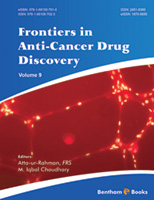Editor: Atta-ur-Rahman, Published on: Dec 6th, 2018.
The ninth volume brings forth interesting reviews on targeted approaches to cancer therapy.
Frontiers in Anti-Cancer Drug Discovery is a book series devoted to publishing the latest advances in anti-cancer drug design and discovery. In each volume, eminent scientists contribute reviews relevant to all areas of rational drug design and drug discovery including medicinal chemistry, in-silico drug design, combinatorial chemistry, high-throughput screening, drug targets, recent important patents, and structure-activity relationships. The book series should prove to be of interest to all pharmaceutical scientists involved in research in anti-cancer drug design and discovery. The book series is essential reading to all scientists involved in drug design and discovery who wish to keep abreast of rapid and important developments in the field.
The ninth volume of the series features chapters covering the following topics:
- New research on the therapeutic intervention of cancer and cancer drug delivery
- Dabrafenib usage in melanoma therapy
- Targeting autophagy in cancer therapy
- Pro-apoptotic and anti-telomerase activity of naturally occurring compounds
- CDK inhibitors
- Oral nanostructure drug delivery for anti-cancer treatment
About The Author:
Atta-ur-Rahman, Ph.D. in organic chemistry from Cambridge University (1968), has over 1080 international publications in several fields of organic chemistry including 751 research publications, 37 international patents, 69 chapters in books and 222 books published largely by major U.S. and European presses. He is the Editor-in-Chief of eight European Chemistry journals. He is Editor of the world's leading encyclopedic series of volumes on natural products, Studies in Natural Product Chemistry, 54 volumes of which have been published under his Editorship by Elsevier during the last two decades.
Keywords: Angeiogenesis, cancer, cancer therapy, chemotherapy, drug delivery, Tumor microenvironment, adoptive immunotherapy, Extracellular matrix, Targeted Therapy, Tumor lymphocyte engineering, gastrointestinal cancer, Immunotherapy, Nanoparticles

